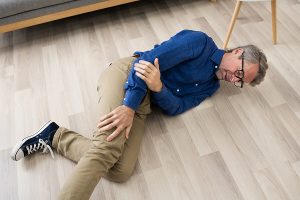Premises Liability: Open and Obvious Hazards in Florida
 Michael Babboni
Premises Liability
Let's say you were on the way to your bank to deposit a check. Along the way, you end up tripping and falling. You have walked into this same bank several times before but never noticed the piece of tile that was missing at the entrance. This caused you to trip and fall and hurt your ankle. However, it isn't just a sprain.
Michael Babboni
Premises Liability
Let's say you were on the way to your bank to deposit a check. Along the way, you end up tripping and falling. You have walked into this same bank several times before but never noticed the piece of tile that was missing at the entrance. This caused you to trip and fall and hurt your ankle. However, it isn't just a sprain.The fall ultimately resulted in more serious damage to your ankle that would require surgery and physical therapy. Now you are racking up the medical bills and wondering how you will get out from under the mountain of debt you now find yourself buried in.
Any premises liability case in Florida, whether it is a slip and fall or a trip and fall, is an incident in which the property could be held liable because they failed to properly maintain the premises.
However, it also brings up several legal questions that need to be answered as you and your personal injury attorney work to prove liability.
What Is an Open and Obvious Hazard?
The bank you tripped at was responsible for making the environment as safe as possible for its patrons. If the bank had prior knowledge of the broken tiles at the entrance and did nothing to remedy the situation, they may be held liable for your injury.
However, suppose the condition in which you were injured was an open and obvious hazard, and you had prior knowledge that the hazard existed. In that case, the property owner may have had no responsibility to warn you of the dangers that hazard posed.
Duty in Premises Liability Cases
The legal concept of duty refers to the legal status a person has when they enter the property. This also determines what duty the property owner owes if they warned them about potential hazards on the property while taking the steps to remedy the situation.
An invitee is considered the highest legal status a person under Florida law can have. This is a person invited to enter a property to do business with the property owner. So, as a bank customer, you are considered an invitee to the business, and the bank owes you the highest duty of care.
Proving Premises Liability in Florida
To win a premises liability claim in Florida, the law requires you to prove all the elements of negligence: the property owner owed you a duty of care, the property owner breached the duty of care, the breach in that duty of care caused you injury. You must present evidence that shows this.
You must be able to show that the property failed to inspect the premises and failed to repair dangerous conditions. You can ask for policy and procedure manuals, video surveillance footage, and witness testimony. You will also need to provide your own testimony as the injured party. Show medical records you have from the accident. This can help establish that the conditions were dangerous on the property and are what caused your injury.
Contact an Attorney
Since premises liability cases can be complicated and hard to prove at times, you want to consult with an experienced personal injury attorney who can walk you through the process and tell you what to expect.
They can help you prove defective conditions contributed to your injuries and can then help you get the compensation you need and deserve to go toward your mounting medical bills and expenses.
